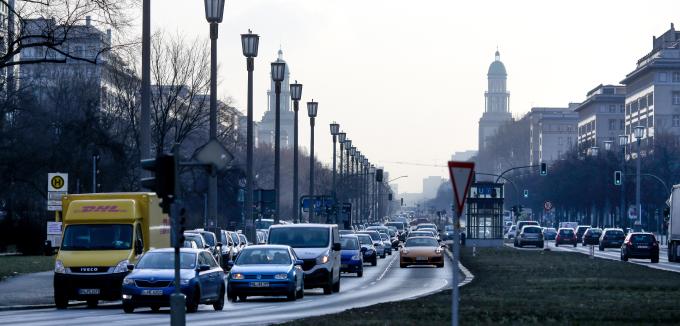
04/25/2018
Diesel death prevented? Bosch technology pushes emissions far below limits
AP
New Bosch technology: Nitrogen oxide emissions are set to drop to 120 milligrams by 2020 – according to Bosch, Bosch is now producing 13 milligrams
The world’s largest automotive supplier Bosch does not want to give up the diesel yet. A newly developed exhaust technology is intended by the exhaust scandal and drive ban debate to preserve discredited drive from the decline and at the same time secure the Group an important business area for the future.
“The nitrogen oxide problem in traffic is technically solvable,” said the chairman of the Bosch management, Volkmar Denner, on Wednesday at the presentation of the balance sheet for 2017. The Group promises, with its new system, the nitrogen oxide emissions of the drive even in real operation far below the current and future limits on the road.
“After our breakthrough, we are sure that in the future nobody will be able to ban the entry into the city of the diesel engine”, emphasized Denner. The technology is so mature that it can be incorporated immediately into the series development of the manufacturers. It should not be more expensive than a normal diesel, have minimal impact on fuel consumption and performance, and also function independently of external factors such as driving style, route profile and temperature.
Diesel vehicles are currently allowed to emit 168 milligrams of nitric oxide per kilometer in real operation. In 2020, the limit is set to drop to 120 milligrams. Bosch can now do 13 on average, said Denner. How exactly this works, the group refers to a combination of newly developed injection technology, temperature management in the engine, air system and the use of artificial intelligence.
The catch: Manufacturers have to integrate the technology first
Denner was convinced to be able to end the debate over the end for the diesel. He also pleaded for the environmental audit of electric cars more critical and realistic to see. “In such an overall view may come out: It is better to drive the right diesel than the wrong electric car,” he said.
The catch: Bosch does not sell complete engines that could be installed just once. And one way to retrofit older diesels is not the new technology either. Even if it is available immediately, the manufacturers would first have to integrate it into their own engine development – which could take years.
The automakers also always point out that the technical progress with the current, cleaner engines that comply with the limits, the diesel nitrous oxide problem will ultimately solve. Owners of older diesels differing from driving bans Of course, this does not help threatened. You would need a new car.
Also read: New diesels are clean – but expensive and thirsty
For Bosch, diesel technology is an important pillar within the Group’s Auto and Mobility division, which accounts for almost half of total revenue and is also growing at an above-average rate. On the whole, Bosch has an operating result of € 5.3 billion (+7 percent) with sales of € 78.1 billion (+6.8 percent) in 2017 – both are the highest figures in history.
For 2018, Chief Financial Officer Stefan Asenkerschbaumer is aiming for a revenue increase of only 2 to 3 percent and at the same time a further increase in earning power. “This is ambitious, also in view of the continuing high level of intermediate consumption with regard to the topics of the future and the major transformation tasks,” he said.
Bosch is consistently investing in electric mobility with billions in investments, emphasized Denner. But: “We need the most efficient combustor with the lowest emissions until electric mobility can be used in the mass market.”
Denner draws consequences from the diesel scandal involving manipulated exhaust-gas purification systems, in which Bosch, as a supplier, is also targeted by the investigators. A new code prohibits developers from incorporating features that recognize test cycles and set the technique for testing differently than normal operation – no matter what customers demand. “If in doubt, the Bosch values take precedence over customer wishes,” said Denner.
mg / AFX
Related articles
more on the subject
© manager magazin 2018All rights reservedReproduction only with the permission of manager magazin Verlagsgesellschaft mbH
